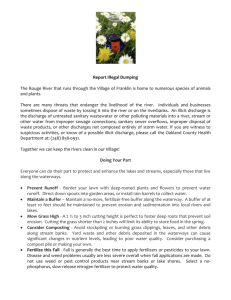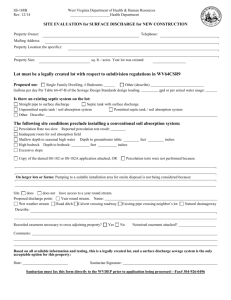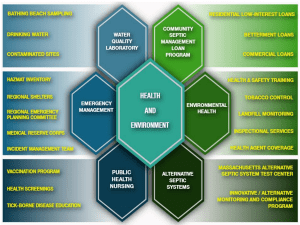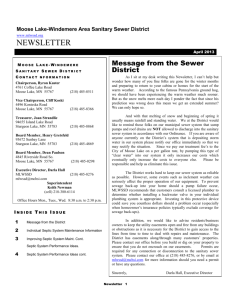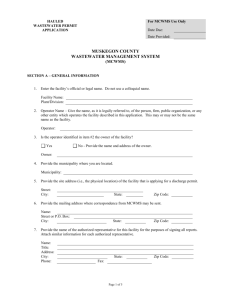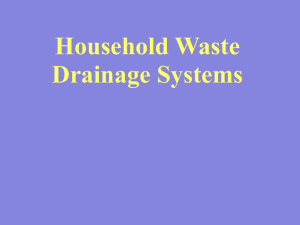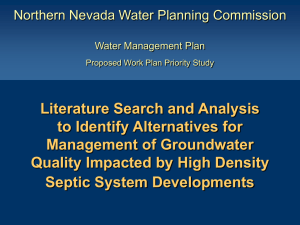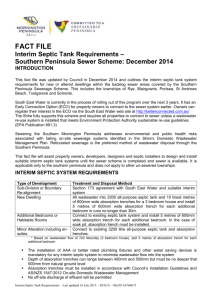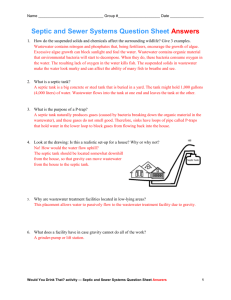Recycle Your Used Motor Oil - Moose Lake
advertisement
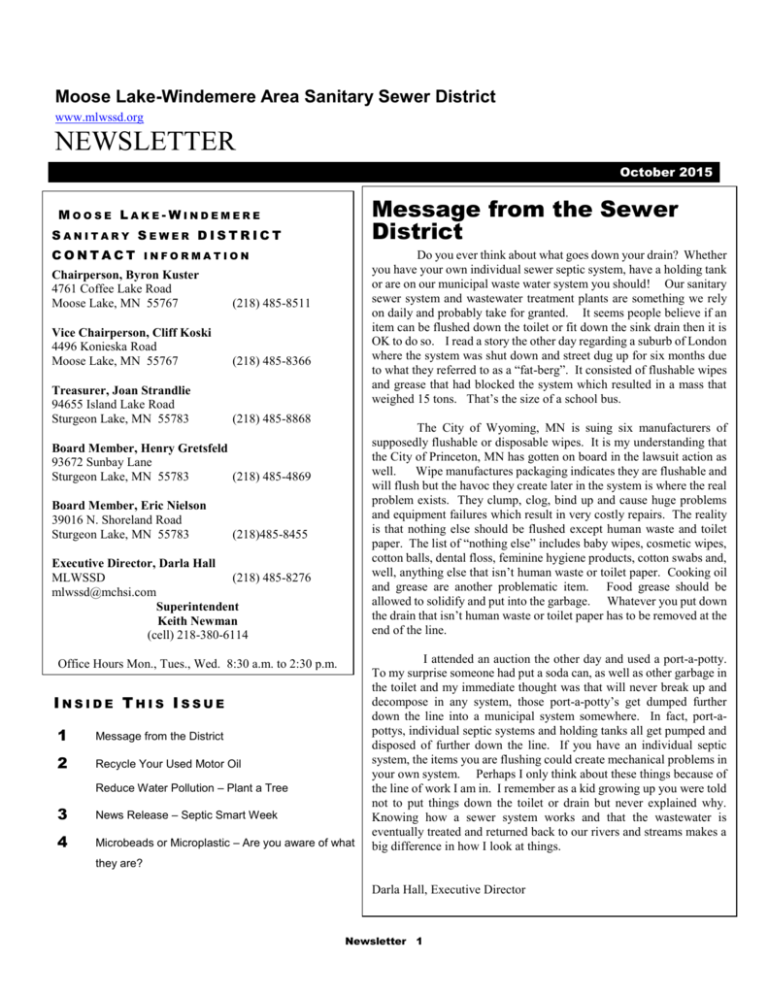
Moose Lake-Windemere Area Sanitary Sewer District www.mlwssd.org NEWSLETTER October 2015 Message from the Sewer District MOOSE LAKE-WINDEMERE SANITARY SEWER DISTRICT CONTACT INFORMATION Chairperson, Byron Kuster 4761 Coffee Lake Road Moose Lake, MN 55767 (218) 485-8511 Vice Chairperson, Cliff Koski 4496 Konieska Road Moose Lake, MN 55767 (218) 485-8366 Treasurer, Joan Strandlie 94655 Island Lake Road Sturgeon Lake, MN 55783 (218) 485-8868 Do you ever think about what goes down your drain? Whether you have your own individual sewer septic system, have a holding tank or are on our municipal waste water system you should! Our sanitary sewer system and wastewater treatment plants are something we rely on daily and probably take for granted. It seems people believe if an item can be flushed down the toilet or fit down the sink drain then it is OK to do so. I read a story the other day regarding a suburb of London where the system was shut down and street dug up for six months due to what they referred to as a “fat-berg”. It consisted of flushable wipes and grease that had blocked the system which resulted in a mass that weighed 15 tons. That’s the size of a school bus. The City of Wyoming, MN is suing six manufacturers of supposedly flushable or disposable wipes. It is my understanding that the City of Princeton, MN has gotten on board in the lawsuit action as well. Wipe manufactures packaging indicates they are flushable and will flush but the havoc they create later in the system is where the real problem exists. They clump, clog, bind up and cause huge problems and equipment failures which result in very costly repairs. The reality is that nothing else should be flushed except human waste and toilet paper. The list of “nothing else” includes baby wipes, cosmetic wipes, cotton balls, dental floss, feminine hygiene products, cotton swabs and, well, anything else that isn’t human waste or toilet paper. Cooking oil and grease are another problematic item. Food grease should be allowed to solidify and put into the garbage. Whatever you put down the drain that isn’t human waste or toilet paper has to be removed at the end of the line. Board Member, Henry Gretsfeld 93672 Sunbay Lane Sturgeon Lake, MN 55783 (218) 485-4869 Board Member, Eric Nielson 39016 N. Shoreland Road Sturgeon Lake, MN 55783 (218)485-8455 Executive Director, Darla Hall MLWSSD (218) 485-8276 mlwssd@mchsi.com Superintendent Keith Newman (cell) 218-380-6114 Office Hours Mon., Tues., Wed. 8:30 a.m. to 2:30 p.m. INSIDE THIS ISSUE 1 Message from the District 2 Recycle Your Used Motor Oil Reduce Water Pollution – Plant a Tree 3 News Release – Septic Smart Week 4 Microbeads or Microplastic – Are you aware of what I attended an auction the other day and used a port-a-potty. To my surprise someone had put a soda can, as well as other garbage in the toilet and my immediate thought was that will never break up and decompose in any system, those port-a-potty’s get dumped further down the line into a municipal system somewhere. In fact, port-apottys, individual septic systems and holding tanks all get pumped and disposed of further down the line. If you have an individual septic system, the items you are flushing could create mechanical problems in your own system. Perhaps I only think about these things because of the line of work I am in. I remember as a kid growing up you were told not to put things down the toilet or drain but never explained why. Knowing how a sewer system works and that the wastewater is eventually treated and returned back to our rivers and streams makes a big difference in how I look at things. they are? Darla Hall, Executive Director Newsletter 1 Recycle Your Used Motor Oil Reduce Water Pollution Water that goes down storm drains does not go to treatment plants. It flows directly to streams, lakes and rivers. Used motor oil can contain concentrations of toxic heavy metals such as zinc, lead, and cadmium that affect the environment including wildlife, vegetation, surface water and drinking water supplies. One quart of oil poured down a storm drain can contaminate one million gallons of water. Used motor oil never wears out. It just gets dirty and can be recycled, cleaned and used again. When you recycle used oil, you are protecting the environment and conserving a valuable resource. If all oil were recycled, it would replace half a million barrels of crude oil each year worth nearly $10 million dollars. Any person selling motor oil or motor oil filters for retail in Minnesota are required to post a sign showing the nearest location where used motor oil may be returned at no cost for recycling or reuse. Or, for locations accepting used motor oil, go to http://earth911.com and search used motor oil. Type in your zip code and it will provide you with locations nearest to you. Recycling used oil helps protect ground and surface waters, fish and wildlife and conserves energy. MLWSSD Meeting Schedule The regular meetings of the Moose Lake Windemere Area Sanitary Sewer District are held on the third Wednesday of the month at our office located at 304 ½ Elm Ave, Moose Lake MN (basement of Downtown Dental). Meeting Schedule is as follows: September thru May meetings begin at 6:00 p.m. June thru August meetings begin at 4:00 p.m. All meetings adjourn when business is complete. If you would like to be on our agenda please call the office at 218-485-8276. Plant a Tree Planting a tree is one of the simplest things you can do to help reduce water pollution in your neighborhood. Trees reduce water pollution by capturing and filtering excess rainwater before it can get to our lakes, streams and wetlands. Once a tree gets planted, the active root systems start to filter out nutrients and pollutants. Over time, tree roots continually expand and create channels in the soil which allows more rainwater to soak into the ground. In addition, trees provide other valuable services such as holding soil in lace, carbon storage, a place to hang your swing, and shade to keep you and your family cool. If trees are planted in the right spots they can lower your home heating and cooling costs as well. Trees also provide food and shelter for our local wildlife. So do something great this fall and go out and plant a tree!! KEEP EASEMENTS CLEAR Moose Lake Windemere Sanitary Sewer District would like to remind residents to keep the utility easements open and free from any buildings or obstructions as it is necessary for the District to gain access to the lines from time to time to deal with repairs and maintenance. MLWSSD has easements along/through many customers’ properties. Before you build or dig on Newsletter your 2 property, please contact our office to make sure that you do not encroach on our easements. It’s SepticSmart Week: Keep Jack Frost from nipping at your septic system Contact: Daniel Olson, 218-846-8108 St. Paul, Minn. — Sept. 21 through 27 is SepticSmart Week. This time of year, families with septic systems should take precautions to prevent costly septic system problems during the winter. Prevent freezing in the first place. Insulation is key to preventing pipes and drainfields from freezing. Allowing grass to grow an extra six inches over the entire system (septic tank, connecting pipes and drainfield/mound) in the fall can protect it from frost. Another good insulator is a layer of mulch (for example, straw, leaves, or hay) spread eight to 12 inches deep over the system. Other ideas include maintaining wildflowers or native grasses over your tank and system. Don’t be a drip, keep it hot. Dripping faucets trickle water into the system, which can cause ice to build up and eventually freeze a pipe closed, often right where the septic pipe leaves the home. Fix all leaks and keep the system “energized” with regular doses of warm water during the winter ― the warmer the better. Spread out your laundry schedule so you run one warm/hot load a day. Use the dishwasher and take hot baths. However, DO NOT leave water running all the time, as this will hydraulically overload the septic system. Keep off the grass (and snow). Keep all vehicle, animal and human traffic off the system. This is a good rule to follow all year long as compacted snow and soils cause frost to go down deeper and faster. Pay special attention to the area between the house and the septic tank. Stay off these areas even during the winter as compacted snow provides much less insulation than undisturbed snow. Keep it safe. Make sure all septic tank covers are in place and firmly attached to prevent someone from falling in. Make sure all inspection pipe caps are in place and in good shape to keep cold air out. Keep new systems under cover. A new septic system covered with bare soil can have problems with freezing the first year. Cover a new tank, mound/drainfield with an insulating layer of mulch or similar loose material. It’s frozen. Now what? If your septic system freezes, call a septic system professional. For Minnesotans, the MPCA website includes a search tool for finding certified professionals in your area. Search online for “MPCA SSTS licensed business search.” If it’s not feasible to correct a problem, the only option is using the septic tank as a holding tank until the system thaws naturally in the spring. Have a pumper empty the tank when it starts to fill up. There are some things you should never do to try to fix a frozen system: Do not introduce antifreeze, salt or a septic system additive into the system. Do not pump sewage onto the ground surface. Do not start a fire over the system to attempt to thaw it out. Do not run water continually to try to thaw the system. This can overload the system. For more information on how your septic system works and how to keep it healthy all year, go to the SSTS Practitioner and Homeowner Information webpage. Newsletter 3 Microbeads or Microplastic – Are you Aware of What They Are? Microbeads or microplastic less than 5mm in their longest dimension and often smaller, down to 0.335 mm are contained in many soap and cleaning products used by consumers. They can be found in toothpaste, soap, exfoliating creams and lotions, and bathroom cleaning products. When these products are used by consumers and are washed down the drains of sinks and showers, the microbeads end up in wastewater treatment systems. Interestingly, it is not our industry that has highlighted these beads as being a problem, but researches looking at the outflow from municipal treatment plants where the beads have been discharged to the surface waters and are then consumed by fish, causing potential environmental and health concerns. If you have your own septic system, the smaller beads can eventually reach your drain field and plug soil pores thus permanently reducing the ability of the soil to accept septic tank effluent. This could result in premature replacement of your system. This year has seen a number of states, including California, Illinois and Minnesota, ban the use of products containing microbeads. A number of other Great Lakes states are also considering bans. To find out more about the microbeads issue or to download an app for identifying items containing microbeads please go to http://beatthemicrobead.org/. THIRD CLASS Moose Lake – Windemere Sanitary Sewer District 304 ½ Elm Avenue PO Box 588 Moose Lake, MN 55767 US POSTAGE PAID MOOSE LAKE, MN 55767 PERMIT NO. #73 Newsletter 4 Newsletter 5 Moose Lake-Windemere 6
